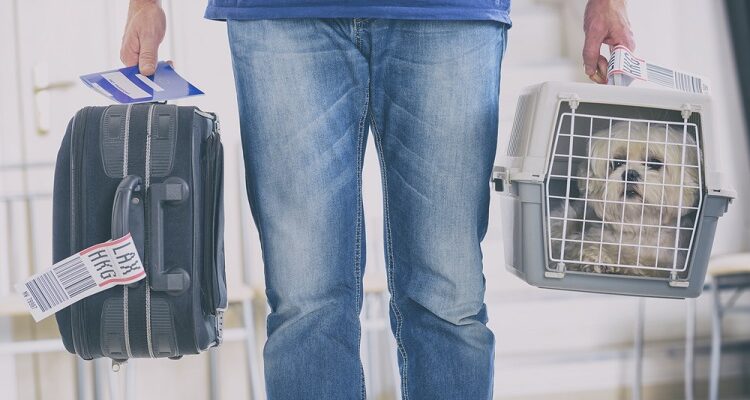Travel with pets can be a rewarding experience, but it requires careful planning to ensure a smooth, comfortable journey for you and your furry friend. From preparing the right travel essentials to understanding your pet’s needs, this guide covers everything you need to know to make travel stress-free. Let’s explore the best practices for making pet travel enjoyable and safe!
Table of Contents
Why Travel with Pets Can Be Challenging?
Pets have unique needs and can experience stress in unfamiliar environments, especially during travel. New surroundings, loud noises, and confined spaces can make them anxious, making the journey challenging for both of you. Understanding potential challenges and preparing beforehand is the best way to avoid issues and ensure a positive travel experience.
Preparing Your Pet for Travel
Schedule a Vet Check-Up
Before embarking on a journey, ensuring that your pet is in good health is crucial. Consulting with professionals like vetcitypets for pet health check-ups can provide valuable insights and tips on travel preparation, ensuring your pet’s well-being during the trip.
- Health Clearance: A quick vet visit can confirm your pet is fit for travel and up-to-date on vaccinations.
- Travel-Specific Medications: Some pets may need medications to ease travel anxiety or prevent motion sickness. Ask your vet for recommendations if needed.
- Microchipping and ID Tags: Ensure your pet has a microchip and updated ID tags with your contact information in case of separation during travel.
Get Your Pet Comfortable with Their Carrier
A carrier is essential for safe pet travel, especially for small dogs and cats.
- Introduce the Carrier Early: Allow your pet to explore the Carrier at home before the trip. Place treats and toys inside to make it a positive space.
- Choose the Right Size: The Carrier should be large enough for your pet to comfortably stand, turn, and lie.
- Use Familiar Bedding: Placing a blanket or item with your scent in the Carrier can help comfort your pet.
Packing Essentials for Traveling with Pets
Bring Food, Water, and Treats
Keeping your pet fed and hydrated is essential, especially on long journeys.
- Pre-Portioned Food: Pack enough of your pet’s regular food in airtight containers. Stick to their normal diet to avoid digestive issues.
- Water Supply: Bring bottled water or a portable water bowl to hydrate your pet.
- Treats for Positive Reinforcement: Use treats to reward good behaviour during travel and keep them calm.
Don’t Forget Pet Travel Essentials
Having the right travel essentials can make a huge difference.
- Leash and Harness: A sturdy leash and harness are a must for walks during breaks.
- Waste Bags: Bring plenty of waste bags for bathroom breaks, especially for dogs.
- Grooming Supplies: A brush, wipes, and other basic grooming supplies can be helpful, particularly for long trips.
- First Aid Kit: A pet-specific kit with bandages, antiseptic wipes, and tweezers for minor injuries or accidents.
Planning Your Route and Breaks
Schedule Frequent Rest Stops
Pets require breaks to stretch and relieve themselves, just like people do.
- Plan Stops Every 2-3 Hours: Allow your pet to walk around and get some fresh air.
- Choose Pet-Friendly Rest Areas: Look for pet-friendly areas or parks along your route where they can safely walk and play.
- Stay Hydrated and Fed: Offer water and light snacks during stops to keep their energy up.
Research Pet-Friendly Accommodations
If you’re planning an overnight stay, ensure your lodging is pet-friendly.
- Check Pet Policies in Advance: Confirm that hotels, motels, or rentals allow pets and check if there are any fees or rules.
- Look for Pet-Friendly Amenities: Some accommodations provide pet beds, bowls, and outdoor areas for pets. This can make your stay more comfortable.
- Prepare for Extra Cleaning: Bring a small blanket to cover furniture your pet may use, helping to keep your lodging tidy and reduce any potential pet-related cleaning fees.
Managing Pet Anxiety During Travel
Keep Your Pet Calm and Comfortable
A relaxed pet is a happy traveller; there are ways to keep stress levels low.
- Calming Aids: Products like calming sprays, chews, or pheromone collars can help reduce travel anxiety.
- Soothing Sounds: Playing gentle music or using a white noise machine in the car can help create a calming environment.
- Avoid Overstimulation: Some pets may feel better in darker, enclosed spaces. Covering the Carrier with a light cloth can help if your pet feels nervous.
Maintain a Routine
Maintaining a familiar routine, even on the road, can help pets feel more secure.
- Stick to Regular Feeding Times: Try to feed your pet at the same times as usual to avoid digestive upset.
- Schedule Play and Exercise: If your pet is used to specific play or exercise times, try incorporating similar activities during your stops.
- Follow Regular Bedtime Routines: A familiar bedtime routine can help your pet relax in new surroundings.
Travelling by Different Modes of Transport
Road Trips with Pets
Driving is often one of the easiest and most pet-friendly ways to travel.
- Secure Your Pet in the Vehicle: Use a pet seatbelt, harness, or secured Carrier to prevent movement and ensure safety.
- Avoid Feeding Right Before the Trip: This could reduce the chance of motion sickness. A few hours before embarking on the excursion, feed your pet.
- Never Leave Pets Unattended: Temperatures in a parked car can rise or drop quickly, so avoid leaving your pet alone in the car.
Air Travel with Pets
Knowing the airline’s pet travel policies is essential if you need to fly.
- Choose Pet-Friendly Airlines: Some airlines have specific pet policies, including in-cabin options. Research options and book early to secure a spot.
- Check Carrier Requirements: Airlines have specific carrier size and type requirements, so ensure your Carrier meets these standards.
- Pre-Flight Exercise: Let your pet get some exercise before the flight to help them relax.
- Arrive Early: Arriving early allows you time to manage any last-minute requirements without feeling rushed.
What to Do in Case of Emergencies
Being ready for emergencies will help you manage any surprises along the way.
- Keep Emergency Contacts Handy: Have your vet’s contact info and a list of vets or pet hospitals along your route.
- Know Where to Get Pet Supplies: Research pet supply stores near your destination or along your route.
- Recognize Signs of Stress or Illness: Watch for any signs of distress, such as heavy panting, excessive drooling, or lack of appetite. Seek veterinary assistance if needed.
Conclusion
Travel with pets can be a joyful experience when you plan and consider their needs. From ensuring a comfortable career to sticking to familiar routines and preparing for emergencies, a little preparation goes a long way. By following these tips, you can make the journey as smooth and enjoyable as possible, creating wonderful memories with your pet.
Travelling with pets requires patience and planning, but the reward of sharing new experiences with your furry friend makes it worthwhile. So, get ready, pack the essentials, and embark on a stress-free journey with your pet by your side!















Comments